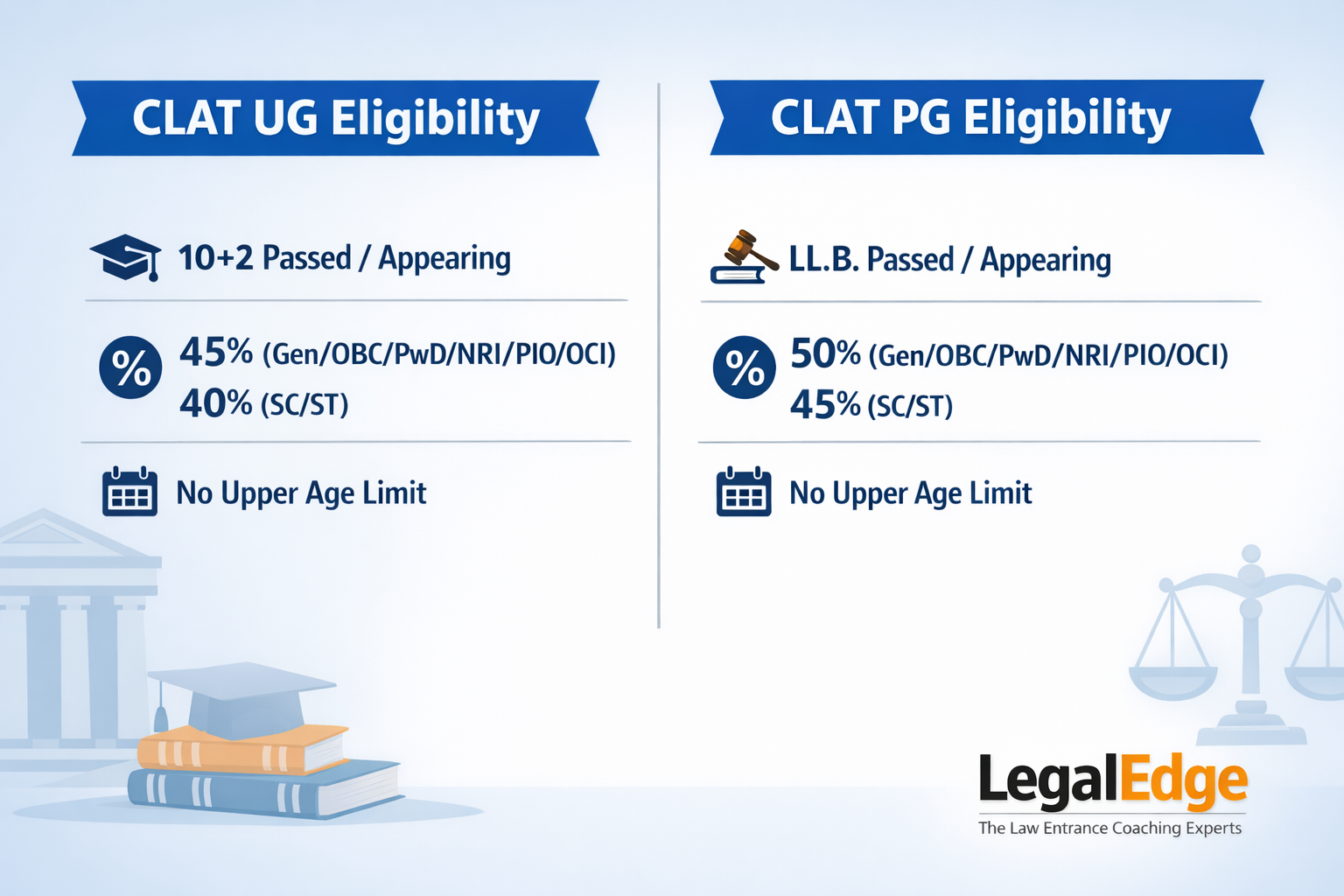CLAT Eligibility Criteria 2027: Age Limit, Criteria & Key Rules Explained
January 8, 2026
Reader's Digest - Do you know that the Consortium of NLUs mandates CLAT Eligibility Criteria 2027 to clarify whether you can apply for the exam? Let's dive deep to infer whether you are eligible for the exam.
The most sought-after entrance exam in India is the Common Law Admission Test, which students can take to secure admission into undergraduate and postgraduate law courses.
CLAT 2027 is conducted by the Consortium of National Law Universities nationwide. However, it is not recommended to prepare for the exam before knowing the CLAT eligibility criteria 2027.
Meeting the CLAT eligibility criteria becomes the first step to achieving your goal of becoming a lawyer. It has all the key information about CLAT eligibility, from generalised parameters to category-specific ones.
In this blog, you shall find the answer to specific questions regarding age limits or the number of attempts at the examination.
Whether you are taking class 12 or have graduated and want to become a lawyer, this blog will clarify all your doubts and let you know if you are eligible to write CLAT 2027.
First, some key points to note:
Before moving on to the details of the CLAT eligibility criteria 2027, there are a few essential points that have to be taken note of by every aspirant,
- CLAT eligibility criteria vary from category to category. Some categories include General, SC/ST, OBC, etc.
- There is no upper age limit in the CLAT entrance examination
- The eligibility criteria for CLAT UG courses vary from those of CLAT PG courses
- One should always maintain at least the minimum marks criterion needed to get into the exam.
- Candidates can sit for the CLAT exam once or multiple times as long as they qualify.
Now is the time to discuss who can take the CLAT exam.
- CLAT UG Eligibility Criteria 2027: Understanding the prerequisites regarding nationality, age limits, and educational qualifications for undergraduate CLAT aspirants.
- CLAT PG Eligibility Criteria 2027: This is a detailed look at the eligibility criteria for postgraduate CLAT applicants, including the essential qualifications.
- CLAT Eligibility Criteria for NRI Students: Special considerations and requirements for NRI candidates pursuing law through CLAT.
Who is Eligible for the CLAT 2027?
The CLAT exam eligibility criteria for undergraduate (UG) and postgraduate (PG) courses differ slightly. Let's first focus on the UG programs:
CLAT UG Eligibility Criteria 2027 Law Courses:
- Educational Qualification: To be eligible for CLAT UG, candidates must have passed the 10+2 or equivalent exam from a recognized board.
- Minimum Marks:
- General and OBC candidates require a minimum of 45% marks in the 12th standard.
- For SC/ST candidates, a minimum of 40% marks is necessary.
- Age Limit: No upper age limit exists for appearing in the CLAT exam. Candidates of any age who meet the educational qualifications can apply for the exam.
- Appearing Candidates: Candidates appearing for their Class 12th exams in 2027 can also apply for CLAT, provided they meet the minimum marks criteria upon results.
For postgraduate programs, the eligibility criteria include:
- An LL.B. or equivalent degree with at least 50% marks for General and OBC candidates.
- A minimum of 45% marks for SC/ST candidates.
CLAT Eligibility Criteria 2027 - Nationality, Age Limit, Qualification
Who can take the CLAT Exam? Understanding the CLAT exam eligibility criteria is essential before completing the CLAT Application Form. You must satisfy the CLAT exam eligibility to complete the CLAT Application Form 2026 successfully.
If you fail to meet the eligibility requirements for CLAT, you will be disqualified from the recruitment procedure without further notice or intimation.
To complete the CLAT Application Form 2027, it is essential to understand the CLAT exam eligibility criteria, including the CLAT UG eligibility, as it determines your eligibility for the exam.
The CLAT exam eligibility is measured mainly on three major factors, as mentioned below:

CLAT Eligibility 2027 - Nationality
- As per the previous year's CLAT UG Eligibility Criteria, Indian Nationals, Non-Resident Indians (NRIs), Overseas Citizens of India (OCIs), and Persons of Indian Origin (PIOs) are eligible to apply for the CLAT Exam 2026, meeting the CLAT UG eligibility requirements.
- Foreign nationals can also apply for CLAT 2027, but must have a valid passport.
Take FREE Demo Class for CLAT 2027 Prep
- The CLAT age limit of 2027 is the first criterion when applying for the Common Law Admission Test.
- According to the Consortium's notification, there is no upper age limit for applying for the CLAT Exam.
Check Here: How to Prepare for CLAT
CLAT Eligibility 2027 - Educational Qualification
Educational qualification plays a significant role in CLAT entrance exam eligibility. So, what are the academic requirements for CLAT 2027?
Let's delve into the details and understand the criteria set by the Consortium. Based on their educational qualifications, determine who is eligible for the CLAT exam.
- To be eligible for CLAT 2027, you must have completed your 10+2 or equivalent examination from a recognised board or university and meet the educational qualification as per the CLAT exam eligibility criteria.
- Suppose you belong to the General/OBC/PWD/NRI/PIO/OCI categories. In that case, you must secure at least 45% marks in the Senior Secondary School or 12th Board Examination to be eligible for the CLAT 2026 exam.
- Those belonging to SC/ST categories must secure 40% marks or an equivalent percentage of marks in the 12th standard.
CLAT Eligibility 2027 - General Criteria
- All those appearing in the 12th standard examination in March/April 2024 can fill out the CLAT Registration Form, provided they satisfy the CLAT UG eligibility requirements.
- However, they should submit the result of the 12th standard examination at the time of admission.
- If you fail to submit the result at the time of admission, you will lose your chance of admission to the desired law school.
CLAT PG Eligibility Criteria 2027 [Nationality, Age Limit & Qualification]
To pursue a postgraduate law course, you must know the CLAT eligibility criteria for age, educational qualifications, and minimum qualifying marks.
Here is a brief overview of eligibility for the LLM course. For the detailed criteria, check CLAT PG Eligibility.
CLAT Eligibility 2027 - Nationality
- As per the official notification from the previous year, Indian Nationals, Non-Resident Indians (NRIs), Overseas Citizens of India (OCIs), Persons of Indian Origin (PIOs), and foreign nationals are eligible to apply for the CLAT PG Exam 2026.
- However, NRIs and foreign nationals must apply for the exam through the NRI quota offered by the CLAT participating colleges.
CLAT Eligibility 2027 - Age Limit
- No upper age limit is set for the CLAT PG Exam, meaning those of any age group can apply for LLM courses.
- However, the minimum age limit to apply for the exam is above 20 years, highlighting the significance of the CLAT eligibility age even for postgraduate law courses.
CLAT Eligibility 2027 - Educational Qualification
- If you appear in the final year of your qualifying examination, you can apply for CLAT PG 2027. However, you must submit your final year mark sheets at admission.
- To be eligible for the CLAT PG 2027, you must have a minimum percentage of 50% in LLB or any other equivalent degree from a recognised university.
- However, the minimum percentage required for SC/ST candidates is 45%. An age relaxation of 5% is given.
CLAT Eligibility 2027 - General Criteria
- If you appear for your qualifying examination in April/May 2027, you can apply for five-year integrated LLB or LLM courses.
Explore LegalEdge Batches for CLAT 2027
CLAT Eligibility Criteria 2027 For NRI Students
NRI aspirants seeking admission under the NRI quota must meet the CLAT test eligibility criteria and complete the necessary admission formalities.
- Admissions for NRI/NRI-sponsored category aspirants are carried out based on their merit score, and the concerned university allocates the CLAT Seat Allotment under the NRI Quota.
- Please get in touch with the concerned university directly for admission formalities, minimum eligibility for the CLAT Exam, required documents, and other related queries about seeking admission under the NRI Quota.
- In case of the non-availability of foreign national seats, seats will be converted into NRI/NRI-sponsored seats.
- The admission will be based on the CLAT ranking in the above case.
- CLAT Office shall be responsible for issuing the list of candidates eligible for CLAT Admission under this category.
List of Documents Required for NRI Candidates for CLAT Admission 2027
If you belong to the NRI category, you must submit the documents below at admission.
- Copy of Valid Indian Passport of the Student
- Visas acquired in the last 12 months
- Certificate from the local embassy stating that the person is an NRI/OCI or PIO Card
Read More: Important Topics for the CLAT Exam
Documents Required for NRI-Sponsored Candidates for CLAT Exam Admission 2027
- Sponsor's copy of a valid Indian passport.
- Visas obtained in the last 12 months by the sponsor
- Certificate from the local embassy stating that the sponsor is an NRI/ OCI or PIO card
- An affidavit by the sponsor indicating the sponsor's interest in the student's education affairs and willingness to fund the education of students over the next five years.
Attempt FREE Mock Test for CLAT 2027 by LegalEdge
Conclusion
Key Takeaways are as follows:
- CLAT can be pursued after completing 12th or graduation.
- Foreign nationals can appear for CLAT.
- There is no minimum age requirement to apply for the exam.
- CLAT can be taken after completing B.Tech, but a minimum required mark is necessary.
- Preparing for CLAT in class 11 is possible, but the exam cannot be taken.
- NRI candidates are eligible for CLAT 2027 but must follow the admission guidelines.
- Eligibility for CLAT is based on nationality, age limit, and educational qualification.
- Indian Nationals, NRIs, OCIs, and PIOs can apply for CLAT.
- Educational qualification requires completion of 10+2 or equivalent with minimum marks.
- The tie-breaking procedure for equal marks includes higher marks in Legal Aptitude and age preference.
- NRI candidates must meet specific eligibility criteria and complete admission formalities.
By thoroughly understanding the CLAT exam eligibility, you can confidently begin your preparation and move one step closer to securing a seat in one of India's prestigious NLUs. Whether a Class 12 student or a graduate, the door to a promising legal career is wide open if you meet the CLAT eligibility criteria 2027.
Frequently Asked Questions
Can I give CLAT exam after the 12th?

I Have Not Cleared the CLAT Exam. Can I Appear for the Exam Again?

Can I Apply for CLAT Through Online or Offline Mode?

Can 12th appearing apply for CLAT?

What is the required percentage to appear for the CLAT exam?







SHARE